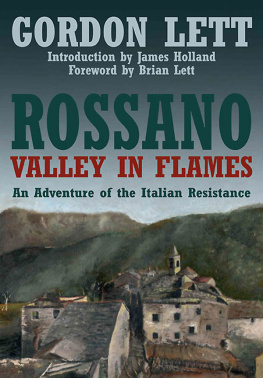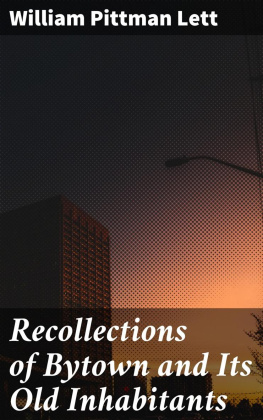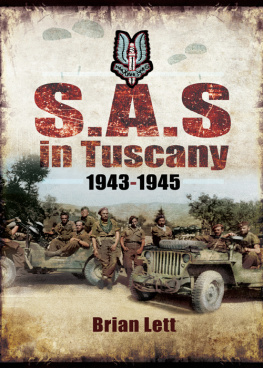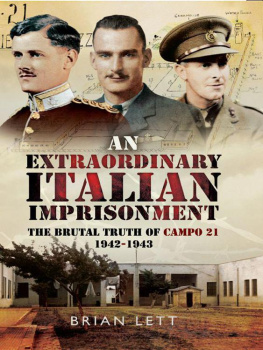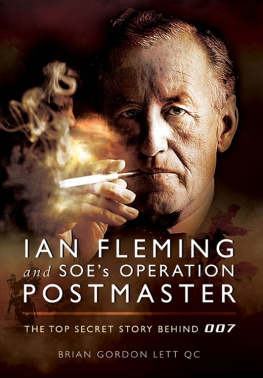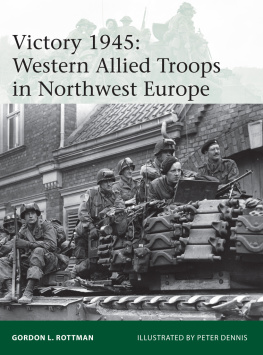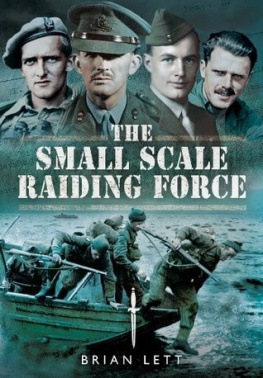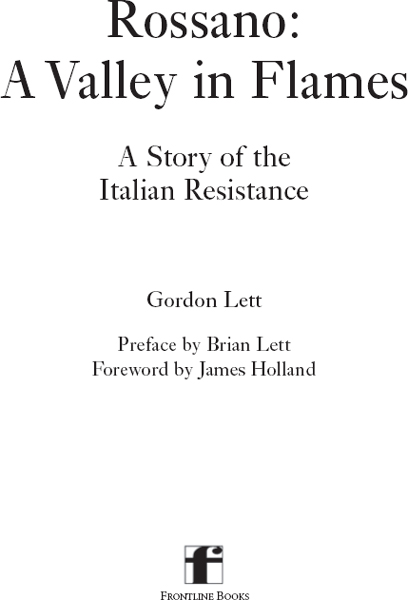To
SHEILA
my beloved wife, without whose encouragement, and patience throughout the long years, Rossano would never have been written, and to little VALERIE and HUGH BRIAN, is this book affectionately dedicated.
I have eaten your bread and salt
I have drunk your water and wine,
The deaths ye died I have watched beside,
And the lives that ye led were mine.
Was there aught that I did not share
In vigil or toil or ease
One joy or woe that I did not know,
Dear hearts across the seas?
Rydyard Kipling
Departmental Ditties
He who tells this tale is not a partisan; he would deal equally towards all. Of strong devotion, of stout nobility, of unswerving faith and self-sacrifice, he must approve; and when these qualities are displayed in a contest of forces, the wisdom of means employed, or of ultimate views entertained, may be questioned and condemned; but the men themselves may not be.
George Meredith
Vittoria
Rossano: A Valley in Flames
This edition published in 2011 by Frontline Books,
an imprint of
Pen & Sword Books Limited,
47 Church Street, Barnsley, S. Yorkshire, S70 2AS
[link:www.frontline-books.com]
Email info@frontline-books.com or write to us at the above address.
Preface Brian Lett, 2011
Copyright Gordon Lett, 2011
Foreword James Holland, 2011
ISBN: 978-1-84832-621-7
The right of Gordon Lett to be identified as the author of this work has been asserted in accordance with the Copyright, Designs and
Patents Act of 1988.
PUBLISHING HISTORY
Rossano: A Valley in Flames was first published in 1955 by Hodder and Stoughton under the title Rossano, An Adventure of the Italian Resistance. It was published in paperback as a Panther edition in 1956. An Italian edition was issued in 1958. This edition includes a preface by the authors son, Brian Lett and a foreword by James Holland.
All rights reserved. No part of this publication may be reproduced, stored in or introduced into a retrieval system, or transmitted, in any form, or by any means (electronic, mechanical, photocopying, recording or otherwise) without the prior written permission of the publisher. Any person who does any unauthorised act in relation to this publication may be liable to criminal prosecution and civil claims for damages.
CIP data records for this title are available from the British Library
Typeset in 11.5pt Ehrhardt
by Mac Style, Beverley, E. Yorkshire
Printed in Great Britain by CPI
Contents
Authors note from the 1971 edition
In this story the names of many of the partisans are those by which they were known in the mountains. This is rendered necessary by the fact that, for them, the political war continues.
List of Illustrations
A Rossano family at work.
Amelia.
Memorial to the people of the Rossano Valley.
The church at Chiesa, Rossano.
Lofty Rose, with two of our friends in Valley.
The Deluchi family, Chiesa, 1954. (L. to R.) Richetto, Babbo, Mamma, Tarquinio and Amelia, with their children.
A section of the International Battalion, March, 1944.
The Valley of Rossano, Monte Picchiara on left, Monte Gottero on skyline. The white buildings are in Chiesa village.
Amelias family, Sperinde, in Valle, 1954. (L. to R.) The father, brother Silvio with wife, daughter and neighbour, Amelias mother, and Romeo.
Palazzo degli Schiavi, barracks of the International Battalion, after the enemy attack of August, 1944.
Supplies descend on Rossano, January, 1945.
Lieutenant Dani of Calice.
Nello Sani (Badoglio).
Nino Ferrari, Francos Quartermaster.
Don Battista Ravini of Torpiana.
Nino Siligato.
Ardito.
The city of Pontremoli, showing the Cathedral dome, and castle in the background.
Monsignor Giovanni Sismondo, Prince of the Vatican State, Bishop and Count of Pontremoli.
The Valley of the River Magra, looking North towards Villafranca and Pontremoli.
The Fortezza della Brunella at Aulla.
Preface
History teaches us that, sometimes, exactly the right man finds himself in exactly the right place at the exactly the right time. That was true, I believe, from the moment of my fathers arrival in the valley of Rossano in the mountains of northern Tuscany on the evening of the 30th September 1943, and throughout his stay of eighteen months.
The Italian resistance was then in its infancy. The dictator Mussolini and his Fascists had been deposed in late July, but then restored to the throne of Italy in mid-September by the Germans. In the interim period, many anti-fascists had exposed themselves, and now faced fierce retribution. The Italian people were experiencing both occupation by an enemy state, and civil war. The Germans had imposed harsh curfew laws upon the local Italian people, and had arrested many of the Italian military, whom they deported to labour camps in Germany.
In the mountains of Northern Tuscany, the level of poverty was extremely high, and life extremely harsh. My father described it as worse than anything that he had seen when serving with the British army in Africa and India. Many youngsters fled from the towns into the mountains to avoid conscription into the new Fascist army, causing an even greater strain upon the limited supplies of food. Justice had fled. The people were bitter and confused, and looked for leadership.
My father was in many ways different from the average British Army officer. He had been born in primitive conditions in Domara, Papua New Guinea in 1910. My grandfather was working there as an engineer, endeavouring to develop the natural resources of the country. My grandmother died as a result of the complications of childbirth. My fathers first years were therefore spent living with his mothers family in Sydney, Australia, whilst his father continued to work in the spartan conditions of Papua New Guinea. At the age of eleven, my father was sent to England to complete his education, where he was cared for by members of his fathers family. He was educated at Clayesmore School, in Dorset, and later at university in Dijon, France..
He took up a commission in the East Surrey Regiment in 1933. Whilst serving in India, he developed a love for the Himalayan mountains, which led him to transfer into the British Indian Army. He led two mountaineering expeditions into the remoter parts of the Himalayas. This brought him a Fellowship of the Royal Geographical Society.
My fathers love of mountains undoubtedly suited him to life in the Apuan Alps, that part of the Appenine mountains where the valley of Rossano lies. He also, of course, had the benefit of ten years military experience. However, I believe that the qualities that enabled him to achieve what he did were his humanity and his humility. He understood and genuinely cared about the problems of the peasants of the Rossano valley and its surrounding areas. He was able to relate to the poorest and the most disadvantaged of its inhabitants. He shared with them much of their deprivation, suffering and hunger, and they responded by giving him a fierce and enduring loyalty.
The neighbouring Centocroci Brigade of partisans, led by Richetto, had as their chaplain Don Luigi Canessa, known as the fighting priest. He knew my father well. He described him as a tall, lean man of few words; he was good, generous and charitable, a true gentleman. The only signs of his rank were the crowns of His British Majesty that he wore on his shoulders. He spoke in halting Italian, his eyes often on the ground as he searched for the precise word that he wanted.
Next page
